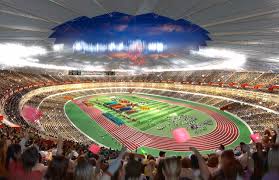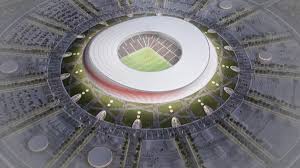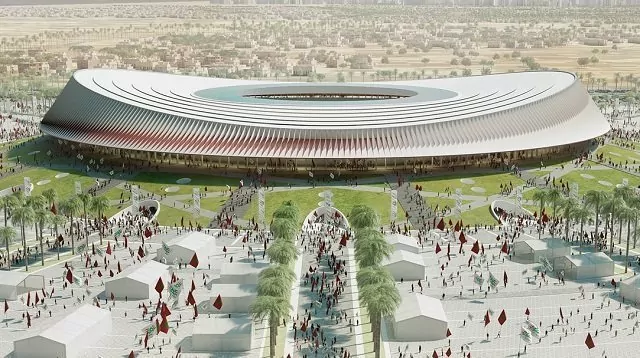Updated 3rd September 2025 – The Grand Stade de Casablanca is a stadium currently under construction in Morocco. The project is a groundbreaking project that is poised to make history in world footballby becomiing the largest stadium in the world.
As host of the 2030 FIFA World Cup alongside Spain and Portugal, Morocco is positioning this mega-stadium as the crown jewel of the tournament. Once complete, it is anticipated to surpass Spain’s Santiago Bernabéu and Camp Nou, making it the leading contender to host the prestigious World Cup final.
The Grand Stade will be located in El Mansouria, a small coastal town just east of Casablanca with fewer than 20,000 residents. The site was strategically chosen for its accessibility and potential to transform the area into a global sporting landmark.
In June 2025, Moroccan construction powerhouses TGCC and SGTM were awarded the second lot of the Grand Stade Hassan II project in Benslimane, a major infrastructure package linked to the stadium’s development. The contract, valued at MAD 3.2 billion (around $320 million), followed the closure of a competitive tender on June 10.
TGCC and SGTM, the sole bidders, successfully met all technical and financial requirements. Their scope of work covers heavy construction, steel framework, waterproofing, interior finishing, and carpentry — all critical components to ensure the stadium meets international standards for safety, capacity, and design excellence.
The Morocco government is building other projects ahead of the World Cup 2030 such as the Grand Stade de Tanger which is also shaping up and almost complete. In a recent update regarding the Grand Stade de Tanger, the stadium will be ready by end of September 2025. This stadium will be used by Morocco to host some of the World Cup matches.
Capacity of Grand Stade de Casablanca
Reported in April 2024 – The stadium is expected to have a sitting capacity of 115,000 spectators. It is set to be the supplant of the Rungrado 1st of May Stadium that is located in Pyongyang in the Republic of North Korea that has a sitting capacity of 114,000 spectators.

The budget for the construction of the upcoming stadium is approximated to be at $500 million which is equivalent to five billion Moroccan dirhams.
The construction of the Grand Stade de Casablanca has been on the pipeline ever since the start of the 20th century. The football stadiums that will be hosting the World Cup 2030 will be announced in the year 2026, by which the overall construction of the stadium is expected to have been finished.
Contractors of the Stadium
The National Agency for Public Facilities (ANEP) in Morocco has just repotedly awarded the design and construction contract of the upcoming stadium to the global architectural firm Populous who will be in collaboration with the French-Moroccan firm Oulalous + Choi (O+C).
“Indeed we are very proud to have been given this prestigious stadium project,” stated Christopher Lee who is the managing director of Populous.

The Grand Stade de Casablanca will become an iconic attraction for all the Moroccan and Casablanca residents upon completion. Addotionally, the stadium will be anchored strongly in the culture of Morocco, with both its traditions and contemporary forms of expression revealed in the design. It will have its roots in both the ancient and primitive customs: the Moussem which is an annual gathering of the nomadic people from the Sahara region, the tent, the garden will also be incorporated, and lastly both the topography and landscape of Morocco as a country will be incorporated in the stadium.

Currently, the largest stadium in Morocco is Mohammed V that is located in Csablanca with a capacity of 67,000. The stadium is approximately half the size of this upcoming stadium which will be just a few minutes away from Casablaca. Moreover, it is also expected to surpass the capacity of Lusail Stadium that is located in Qatar, which hosted the FIFA world cup 2022 finals and one of the best world cup finals between Kylian Mbappe’s France and Lionel Messi’s Argentina.
Also read: 10 Futuristic Football Stadiums Redefining the Game around the World
